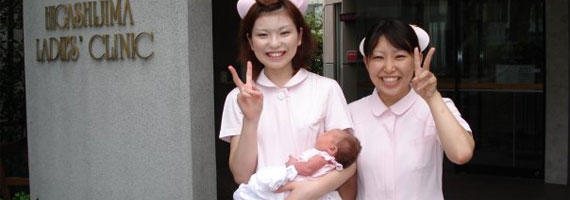My maternal clock started ticking again when my son was two years old. I wanted a second baby. But there was one little problem: we were stationed in Japan. And I wasn’t quite sure I was adventurous enough to bring a baby back as a souvenir.
On the other hand, my husband had a 3-year tour there, and I didn’t want to wait until we returned to the states to have another child. I saw pregnant women and new moms walking around base all the time. Having a baby OCONUS couldn’t be that different, could it?
Most new moms love telling their birth story, so every time I saw one at the base play group or in line at the commissary, I peppered them with questions about every detail of the Japanese birth experience. After several thorough rounds of questioning, I was relatively certain I didn’t have anything to worry about – so I decided to go for it.
A year and some change later, I was retelling my own Japanese birth story. Everything about having my daughter in a clinic in Japan was different than having my son in a naval hospital stateside. But it was an amazing experience I wouldn’t hesitate to do all over again.
Considering having a baby overseas? Here are five do’s and don’ts when having a baby OCONUS:
DO find out your hospital options. The most obvious option when having a baby OCONUS is the military hospital on the base where you’re stationed. However, this isn’t always a possibility.
The base where we were stationed in Japan was so small that we didn’t have a naval hospital. I was told I could either have the baby in a local Japanese “ladies' clinic,” travel to a larger Navy base that did have a hospital, or go back to the U.S. Like most moms-to-be in my situation, I chose the Japanese clinic. But there are upsides and downsides to each option, and I knew women who chose differently. If you’re given choices as far as where you’ll be laboring and delivering, figure out what works best for you early-on in the pregnancy.
DON’T worry about citizenship. When I told friends and family I was having a baby in Japan, one of the first questions they asked was, “Will the baby be a Japanese citizen?” I heard that question even more when I explained that she would be born in a Japanese medical facility and not on a military installation.
But sure enough, she is a U.S. citizen. This will be the case for most military couples having babies OCONUS, but it depends on your own citizenship. Questions about citizenship? This website has the answers.
DO prepare for cultural differences. No matter what foreign country you’re in, you can always expect some cultural differences. And if you have your baby in a facility other than a military hospital, you need to remember that and plan accordingly.
“In Germany, you could be in the hospital for a week because the pediatrician might only come in once a week,” says Ann Marie Detavernier, an Army wife who had her daughter in Germany. “They keep you until you are well. That is their culture.”
When I was in labor with my daughter, I was shocked by the difference in attitude towards food. Most American doctors discourage eating while in labor. But at the Japanese clinic, I was expected to eat a four course meal in between contractions! (I have to admit that my husband ate most of the food I was given, but there was something about that miso soup that I swear gave me magical supermom powers.)
Another cultural difference? Japanese women don’t typically do epidurals, and most doctors seem reluctant to administer them. If the possibility of not having an epidural is a deal breaker for you, you should probably look into another option.
DON’T procrastinate on paperwork. Paperwork is a given wherever you have a baby. But having a baby OCONUS creates some additional paperwork, such as a Consular Report of Birth Abroad, which is necessary for your child’s proof of U.S. citizenship. The processing of new baby paperwork overseas isn’t always done in a timely manner, so don’t wait, especially if you’re looking at a CONUS PCS soon.
“Be sure to have realistic expectations with paperwork,” advises Detavernier. “It took a month to get her social security number and birth certificate. Then we had to mail it all in for the passport. It took 4 months for my daughter to get her passport so we could leave the country. It can be fast tracked in emergencies, but not normally.”
She also recommends keeping multiple copies of paperwork, as well as getting a power of attorney written with language that specifies your ability to register the baby in DEERS and apply for a passport in the event your servicemember is deployed.
DO go with the flow. My OB spoke broken English, and the only English the nurses knew was how to count to ten. But despite the language barrier, I still managed to have an incredible birthing experience. That’s partly because I reminded myself that, just as I had to do toward every other aspect of living in a foreign country, I needed to have an open mind and expect the unexpected.
“Know to relax and not be a control freak,” advises Amber Turner, a Navy wife who also had her daughter in Japan. “You can’t speak their language, and they cannot speak yours in most cases. But they have delivered thousands of babies, so they know what they are doing.”
Have you had a baby OCONUS? What tips would you add to the list?









